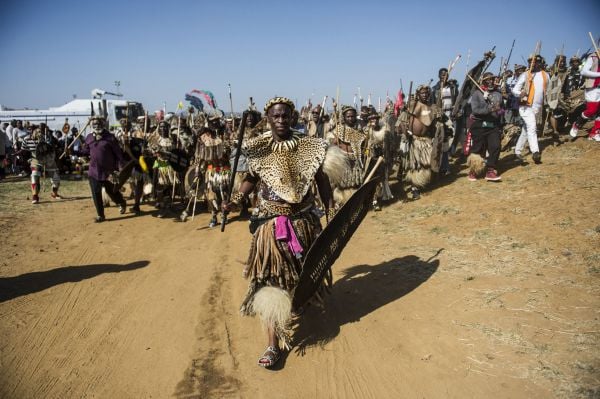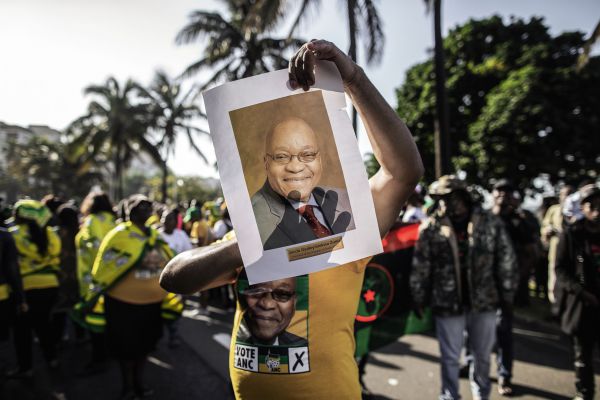King Goodwill Zwelithini greets President Cyril Ramaphosa in Nongoma earlier this year.
President Cyril Ramaphosa and his supporters appear to have lost control of the governing party on a series of key political issues and his authority seems to have been usurped by backers of his predecessor, Jacob Zuma.
Ramaphosa’s visit last week to reassure Zulu King Goodwill Zwelithini that land under the Ingonyama Trust would not be expropriated is seen as the latest in a number of setbacks he has suffered, and that the ANC’s position on communal land is being dictated by its KwaZulu-Natal provincial structure.
In the past, the president and his supporters were supportive of the work of Parliament’s high-level panel, which had recommended scrapping the trust and providing security of tenure to communities living on trust land. Now, however, they have been forced back from any plans to expropriate communal land to focus instead on the expropriation of commercial land in white hands.
The KwaZulu-Natal ANC — and party secretary general Ace Magashule — had already apologised to the monarch and distanced themselves from the recommendations of the high-level panel on socioeconomic change, chaired by former president Kgalema Motlanthe. The panel recommended the scrapping of the trust, set up in 1994 to give the monarch control of the former KwaZulu homeland and the extension of security of tenure to rural residents living on trust land.
At the ANC’s national elective conference, held at Nasrec in December, it was resolved that expropriation without compensation should be among the key mechanisms available to the government to give effect to land reform and redistribution.
It was also resolved that interventions to achieve these objectives, as well as the third element of the ANC’s approach — security of tenure — should “focus on government- owned land” and should prioritise the redistribution of “vacant, unused or underutilised state land, as well as land held for speculation and hopelessly indebted land”.
In addition, the conference resolved to “accelerate the rolling out of title deeds to black South Africans in order to guarantee their security of tenure and to provide them with instruments of financial control”, and to “democratise control and administration of areas under communal land tenure”.
The Ramaphosa camp had attempted to push forward with reforms to the Ingonyama Trust, but Zuma’s supporters inside and outside the party have conflated attempts to remove land from tribal control with the former president’s corruption case. Zuma’s court appearances have been turned into rallies at which the ANC has been told to back off from both him and the monarch or face a loss of support during next year’s general elections.

Provincial power: The support for the Zulu king and Jacob Zuma in KwaZulu-Natal has been evident during recent events such as a land imbizo (above) and the former president’s court appearance. (Delwyn Verasamy/M&G & AFP)

At the ANC’s national executive committee (NEC) meeting on land last month, it was recommended that the party convene a summit on communal land, communal tenure and traditional systems that involved all role players.
This week, the ANC in KwaZulu-Natal called its own land summit, saying it was doing so to “process” the party’s national conference resolutions on land reform and to discuss the report of the ANC’s national land summit, held earlier this year.
The ANC in the province also wanted to consolidate its position ahead of this week’s land reform hearings called by Parliament’s constitutional review committee. The province will also make its own policy recommendations at the summit on communal land, and is expected to continue backing the existence of the Ingonyama Trust.
Both convener Mike Mabuyakhulu and co-ordinator Sihle Zikalala made it clear that there would be no expropriation of communal land under the king and amakhosi, and that expropriation would focus squarely on “commercial land” currently under white control.
Mabuyakhulu said the issue of Ingonyama Trust land was not currently up for discussion, and Zikalala used the summit to criticise the high-level panel for apparently failing to consult with the ANC leadership, the provincial government and traditional leaders.
ANC Eastern Cape heavyweight and Zuma backer Andile Lungisa said the party conference had resolved that land should be expropriated without compensation and that other considerations, such as passing new legislation, were “not core” to implementing the resolutions.
“The conference of the ANC said: ‘Let us expropriate land without compensation; let us amend section 25 of the Constitution,’” he said.
Lungisa said the ANC resolution on land had been “toned down” and that things that were “not core” had been introduced.
A senior ANC leader, who asked not to be named, said Ramaphosa was “not listened” to and “lacked that fear, that respect” and an ability to hold the organisation together.
He said Ramaphosa had angered people in the ANC by allowing the public enterprises minister, Pravin Gordhan, to call the shots and was also seen as being responsible for the slow pace of implementing resolutions on land, mining and the economy in general.
Ramaphosa had made a mistake by “crawling” in front of the king, the ANC leader said. “Mandela never knelt in front of the king. Mbeki didn’t kneel for a king. Zuma didn’t kneel for the king … this is not a monarchy,” he said. “He [Ramaphosa] is not resolving any internal ANC challenges … this period is no better than the one before.”
NEC member Mathole Motshekga said it was “unfair” to both the party’s KwaZulu-Natal leadership and Ramaphosa to take the view that the province had undermined the president on the Ingonyama Trust issue.
Motshekga, a member of Parliament’s constitutional review committee, said the ANC in the province was fully entitled to “take a view” on the Ingonyama Trust issue and “seek to persuade” the NEC, whose job it was to interpret and implement the party’s resolutions, to take that position.
Ramaphosa was perfectly within his rights to engage with the king as there were “people who had jumped the gun and suggested that the ANC had taken a position on how to deal with the Ingonyama Trust”, he said.
“The issue of the Ingonyama Trust was dealt with by the high-level panel. That panel had a responsibility as well to make recommendations, but its recommendations are not the position of the ANC … they are the recommendations of a panel,” Motshekga said.
The recommendations would be “taken into account” when the ANC took a final decision on how to handle the issue of security of tenure on communal land.
“You cannot say there was finality on the matter and that, when the president engages with the king, he is not in charge. He is fully in charge,” he said.
Ramaphosa had “clarified” that expropriation was not aimed at communal land. The issue of individual title on communal land was still the subject of an ongoing debate, he said.
Zuma’s supporters also appear to have won the battle over his participation in next year’s election campaign. Whereas the ANC’s alliance partners and some NEC members want Zuma to be kept out of the campaign because of the fraud and corruption charges he faces, his KwaZulu-Natal backers have ignored this.
The former president has been given a series of platforms by ANC regions in the province and his home region, Musa Dladla, used him in the ANC voter registration campaign earlier this year and in a recent by-election, which the ANC lost, in Nkandla.
The ANC’s alliance partners had planned to use last weekend’s alliance political council meeting to call for Zuma’s removal from the 2019 campaign but days earlier, ANC elections head Fikile Mbalula announced that Zuma would, in fact, be part of the election drive.
Parliament does not believe that the battle over the high-level panel’s recommendations is over.
Phumzile Mnguni, the deputy chair of Parliament’s land reform portfolio committee, which is dealing with the panel’s recommendations on land, said even though Ramaphosa’s meeting with the king was “welcome” and “timely”, it did not mean that Parliament’s process regarding the panel’s report was over.
Mnguni said that, in reassuring the Zulu king that communal land was not being targeted for expropriation without compensation, Ramaphosa had “articulated the state’s position” that communal land was not part of the current discussion.
Mnguni said Parliament would decide whether it would implement all, some or none of the panel’s recommendations.
Mnguni added that he was aware of threats by the Ingonyama Trust Board (ITB) to take Parliament to court over the report and that it had asked for committee minutes.
“We do not have any correspondence from their lawyers at this stage,” he said. “What action they take is up to them. For now, they are governed by the ITB Act, which mandates that they must be accountable to Parliament, must not act willy-nilly and must abide by the law.”